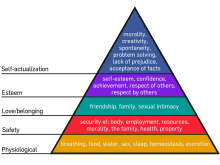Abraham Maslow
Appearance
(Redirected from Abraham H. Maslow)
Abraham Harold Maslow (April 1, 1908 – June 8, 1970) was an American psychologist who pioneered humanistic psychology and developed ideas related to a hierarchy of needs.
Quotes
[edit]



1940s-1960s
[edit]- It is too often not realized that culture itself is an adaptive tool, one of whose main functions is to make the physiological emergencies come less and less often.
- A Theory of Human Motivation (1943)
- Human nature is not nearly as bad as it has been thought to be... In fact it can be said that the possibilities of human nature have customarily been sold short.
- Maslow (1954), as cited in: Hiram E. Fitzgerald, Michael G. Walraven (1987). Psychology. p. 119; Also in: Maslow, Toward a Psychology of Being. Simon and Schuster, 1962, p. 5.
- Variant quote: Human nature is not nearly as bad as it has been thought to be... It is as if Freud supplied us with the sick half of psychology and we must now fill it out with the healthy half.'
- I am deliberately rejecting our present easy distinction between sickness and health, at least as far as surface symptoms are concerned. Does sickness mean having symptoms? I maintain now that sickness might consist of not having symptoms when you should. Does health mean being symptom-free? I deny it. Which of the Nazis at Auschwitz or Dachau were healthy? Those with a stricken conscience or those with a nice, clear, happy conscience? Was it possible for a profoundly human person not to feel conflict, suffering, depression, rage, etc.?
In a word if you tell me you have a personality problem, I am not certain until I know you better whether to say "Good" or "I'm sorry". It depends on the reasons. And these, it seems, may be bad reasons, or they may be good reasons.
An example is the changing attitude of psychologists toward popularity, toward adjustment, even toward delinquency. Popular with whom? Perhaps it is better for a youngster to be unpopular with the neighboring snobs or with the local country club set. Adjusted to what? To a bad culture? To a dominating parent? What shall we think of a well-adjusted slave? A well-adjusted prisoner? Even the behavior problem boy is being looked upon with new tolerance. Why is he delinquent? Most often it is for sick reasons. But occasionally it is for good reasons and the boy is simply resisting exploitation, domination, neglect, contempt, and trampling upon. Clearly what will be called personality problems depends on who is doing the calling. The slave owner? The dictator? The patriarchal father? The husband who wants his wife to remain a child? It seems quite clear that personality problems may sometimes be loud protests against the crushing of one's psychological bones, of one's true inner nature.- "Personality Problems and Personality Growth", an essay in, The Self : Explorations in Personal Growth (1956) by Clark E. Moustakas, p. 237, later published in Notes Toward A Psychology of Being (1962).
- The higher people get, the more evolved and psychologically healthy people get, the more will enlightened management policy be necessary in order to survive in competition and the more handicapped will be an enterprise with an authoritarian policy.
- Summer notes on social psychology of industry and management at Non-Linear Systems, inc., Del Mar, California, Non-Linear Systems, Inc, 1962, p. 81.
- The best product should be bought, the best man should be rewarded more. Interfering factors which befuddle this triumph of virtue, justice, truth, and efficiency, etc., should be kept to an absolute minimum or should approach zero as a limit.
- Eupsychian Management : A Journal (1965), p. 212.
- If swindling pays, then it will not stop. The definition of the good society is one in which virtue pays. I can now add a slight variation on this; you cannot have a good society unless virtue pays. But here we get very close to the whole subject of metaneeds, and also of the ideal conditions where dichotomies are resolved and transcended.
- Eupsychian Management : A Journal (1965), p. 213.
- I suppose it is tempting, if the only tool you have is a hammer, to treat everything as if it were a nail.
- The Psychology of Science: A Reconnaissance (1966), Ch. 2, p. 15; although some similar statements to describe fundamental errors in human perception have been attributed to others, his expression, or slight paraphrases of it, is one of the earliest yet found to be documented in published writings, and remains among the most popular.
Motivation and Personality (1954)
[edit]
- For our chronically and extremely hungry man, Utopia can be defined simply as a place where there is plenty of food. He tends to think that, if only he is guaranteed food for the rest of his life, he will be perfectly happy and will never want anything more. Life itself tends to be defined in terms of eating. Freedom, love, community feeling, respect, philosophy, may all be waved aside as fripperies that are useless since they fail to fill the stomach. Such a man may fairly be said to live by bread alone. It cannot possibly be denied that such things are true, but their generality can be denied. Emergency conditions are, almost by definition, rare in the normally functioning peaceful society.
- p. 17.
- Secrecy, censorship, dishonesty, and blocking of communication threaten all the basic needs.
- p. 23.
- The good or healthy society would then be defined as one that permitted people's highest purposes to emerge by satisfying all their basic needs.
- p. 31.
- A musician must make music, an artist must paint, a poet must write, if he is to be ultimately at peace with himself. What a man can be, he must be. This need we may call self-actualization. This term, first coined by Kurt Goldstein, is being used in this paper in a much more specific and limited fashion. It refers to the desire for self-fulfillment, namely, to the tendency for him to become actualized in what he is potentially. This tendency might be phrased as the desire to become more and more what one is, to become everything that one is capable of becoming.
- p. 93.
- Love, safety, belongingness and respect from other people are almost panaceas for the situational disturbances and even for some of the mild character disturbances.
- p. 103.
- Human beings seem to be far more autonomous and self-governed than modern psychological theory allows for.
- p. 123.
- The study of crippled, stunted, immature, and unhealthy specimens can yield only a cripple psychology and a cripple philosophy. The study of self-actualizing people must be the basis for a more universal science of psychology
- p. 234.
- One of the goals of education should be to teach that life is precious.
- p. 255.
1970s and later
[edit]- Education is learning to grow, learning what to grow toward, learning what is good and bad, learning what is desirable and undesirable, learning what to choose and what not to choose.
- The Farther Reaches of Human Nature (1971).
- What is necessary to change a person is to change his awareness of himself.
- As quoted in Life In the Open Sea (1972) by William M. Stephens, p. 21.
- And I may add that it taught me something about the limitations of the small . . . orthodox scientist who won't recognize as knowledge, or as reality, any information that doesn't fit into the already existent science.
- As quoted in New Pathways In Psychology (1972) by Colin Wilson
- The story of the human race is the story of men and women selling themselves short.
- As quoted in Road Signs for Success (1993) by Jim Whitt, p. 61.
- Laugh at what you hold sacred, and still hold it sacred.
- As quoted in Relax — You May Have Only a Few Minutes Left : Using the Power of Humor to Overcome Stress in Your Life and Work (1998) by Loretta LaRoche, p. xvii.
- If you plan on being anything less than you are capable of being, you will probably be unhappy all the days of your life.
- As quoted in Perfecting Private Practice (2004) by Joan Neehall-Davidson, p. 95.
- The way to recover the meaning of life and the worthwhileness of life is to recover the power of experience, to have impulse voices from within, and to be able to hear these impulse voices from within — and make the point: This can be done.
- As quoted in The Meaning of Life : According to the Great and the Good (2007) edited by Richard T. Kinnier.
- You will either step forward into growth, or you will step backward into safety.
- As quoted in How the Best Leaders Lead : Proven Secrets to Getting the Most Out of Yourself and Others (2010) by Brian Tracy, p. 35.
Quotes attributed to Abraham Maslow
[edit]- Since my mother is the type that's called schizophrenogenic in the literature—she's the one who makes crazy people, crazy children—I was awfully curious to find out why I didn't go insane.
- As quoted in Colin Wilson New Pathways in Psychology: Maslow and the Post-Freudian Revolution (1972, 2001), 155-56.
- [Concerning] the usual contempt with which an orthodox analytic group treats all outsiders and strangers ... I urge you to think of the young psychoanalysts as your colleagues, collaborators and partners and not as spies, traitors and wayward children. You can never develop a science that way, only an orthodox church.
- Letter to a colleague (Nov 1960). In Colin Wilson, New Pathways in Psychology: Maslow and the Post-Freudian Revolution (1972, 2001), 154.
- We fear to know the fearsome and unsavory aspects of ourselves, but we fear even more to know the godlike in ourselves.
- Attributed to Maslow by Toni Galardi in The LifeQuake Phenomenon: How to Thrive (Not Just Survive) in Times of Personal and Global Upheaval (2009). Also to be found in other self-help books and on many quotes sites, but always without citation.
Quotes about Abraham Maslow
[edit]- Psychologist Abraham Maslow described an innate human drive beyond basic survival and emotional needs — a hunger for meaning and transcendence. This concept of "self-actualization" rapidly gained adherents. "It is increasingly clear," Maslow wrote, "that a philosophical revolution is under way. A comprehensive system is swiftly developing, like a tree beginning to bear fruit on every branch at the same time." He described a group he thought of as Transcenders, "advance scouts for the race," individuals who far exceeded the traditional criteria for psychological health. He compiled a list of around three hundred creative, intelligent individuals and groups of individuals whose lives were marked by frequent "peak experiences" (a term he coined). This was his Eupsychean Network — literally, "of good soul." Transcenders were irresistibly drawn to each other, he said; two or three such people would find each other in a roomful of a hundred, and they were as likely to be businessmen, engineers, and politicians as poets and priests.
- Marilyn Ferguson in The Aquarian Conspiracy (1980)
- Dr. Abraham Maslow opened the way to a new look at mental health. He studied several persons whom he saw as self-actualizing and fully human. What he reported about their "peak experiences" rang uncannily like the reports of the mystics. Here at last was someone trying to establish a model of the healthy psyche, and included in it, almost like a stamp of authenticity, was the mystical experience!
- Nina Graboi One Foot in the Future: A Woman's Spiritual Journey (2000), Chapter Twenty-three
- Lachman says, people miss seeing that he [Maslow) was responsible for a major shift of focus within the discipline. "He really was ground-breaking in his thinking," Lachman says. "He was saying that you weren't acting on the basis of these uncontrollable, unconscious desires. Your behaviour was not just influenced by external rewards and reinforcement, but there were these internal needs and motivations." Unlike the psychoanalysts and behaviourists who preceded him, Maslow was not that interested in mental illness - instead of finding out what went wrong with people, he wanted to find out what could go right with them. This opened the door for later movements such as humanistic psychology and positive psychology, and the "happiness agenda" that preoccupies the current UK government.
- Abraham Maslow and the pyramid that beguiled business, William Kremer and Claudia Hammond, BBC World Service (September 2013)
- Some years ago, an American psychologist, Abraham Maslow, felt the same kind of instinctive revolt against the 'atmosphere' of Freudian psychology, with its emphasis on sickness and neurosis, and decided that he might obtain some equally interesting results if he studied extremely healthy people. He therefore looked around for the most cheerful and well-adjusted people he could find, and asked for their co-operation in his studies. he soon discovered and interesting fact: that most extremely healthy people frequently experience of intense affirmation and certainty; Maslow called these 'peak experiences.' No one had made this discovery before because it had never struck anyone that a science calling itself 'psychology' and professing to be a science of the human mind (not merely the sick mind), ought to form its estimate of human beings by taking into account healthy minds as well as sick ones. A sick man talks obsessively about his illness; a healthy man never talks about his health; for as Pirandello points out, we take happiness for granted, and only begin to question life when we are unhappy. Hence no psychologist ever made this simple and obvious discovery about peak experiences.
- Colin Wilson in Introduction to the New Existentialism, p. 15. (1966)
- Maslow's psychology, firmly based upon Freud and Watson, simply points out that the optimistic side of the picture has been overlooked; the deterministic laws of our 'lower nature' hold sway in their won field; but there are other laws. Man's freedom is a reality -- a reality that makes a difference to his physical, as well as his mental health. When Frank's prisoners ceased to believe in the possibility of freedom, they grew sick and died. On the other hand, when they saw that Dachau had no chimney, standing out all night in the rain seemed no great hardship; they laughed and joked. The conclusion needs to be stated in letters ten feet high. In order to realise his possibilities, man must believe in an open future; he must have a vision of something worth doing. And this will not be possible until all the determinism and pessimism that we have inherited from the 19th century -- and which has infected every department of our culture, from poetry to atomic physics -- has been dismissed as fallacious and illogical. Twentieth century science, philosophy, politics, literature -- even music -- has been constructed upon a weltanschauung that leaves half of human nature out of account.
- Colin Wilson in New Pathways In Psychology, p 219-220 (1972)
External links
[edit]- Abraham Maslow profile in Personality Theories (1998) by C. George Boheree
- "Maslow's Vision of Human Nature" adapted from the Editor's Introduction to Toward a Psychology of Being (3rd ed.)
- Excerpts from Toward a Psychology of Being, 2nd ed.
- A Theory of Human Motivation (1943)
- A Theory of Human Motivation (Annotated)
- Maslow's Hierarchy of Needs, at Teacher's Toolbox
- Maslow's Hierarchy of Needs
- Comprehensive bibliography of Maslow's works
Categories:
- 1908 births
- 1970 deaths
- Academics from the United States
- Psychologists from the United States
- Non-fiction authors from the United States
- Presidents of the American Psychological Association
- Jews from the United States
- Atheists from the United States
- Humanists
- People from New York City
- Cornell University alumni


